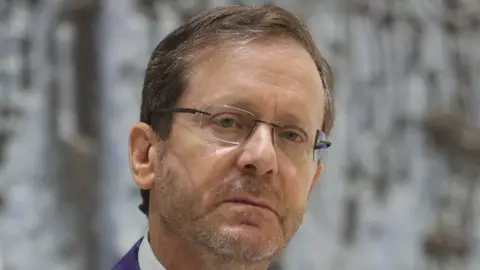Israeli President Isaac Herzog defends Gaza operation
 EPA
EPAIsraeli President Isaac Herzog has strongly defended his country's military operations in Gaza.
In a BBC interview, he insisted Israel was putting "a huge focus" on reducing civilian casualties.
Asked about UN figures that nearly 70% of more than 8,000 deaths were women and children, he said no-one wanted them to pay the price.
But he said Israel was fighting "a bitter enemy which had carried out shocking atrocities".
On 7 October, Hamas launched unprecedented attacks on southern Israel, killing more than 1,400 people and taking more than 230 people hostage.
Mr Herzog said Israel had to destroy Hamas's infrastructure.
He accused the group, designated as a terrorist organisation by the UK and many other Western governments, of firing rockets from inside people's homes.
Israel attacked, he said, when it saw "terrorists who are trying to attack us or launch things against us".
Israel's Arab neighbours, including countries who have signed peace treaties with the Jewish state, have warned that rising civilian casualties in Gaza would push the region into a much wider conflagration.
"We listen and we respect them," he said, but added that "first and foremost, we have to take care of our citizens".
'We're helping people to move out'
Asked about almost-daily warnings from Israel's closest ally, the United States, to exercise caution, he retorted that Israel was being cautious and it "couldn't be measured in numbers".
The president also said Israel was in daily touch with the US, UK and other Western allies about bringing in more humanitarian aid to Gaza.
The US has said 100 trucks a day will soon be allowed to enter southern Gaza through the Rafah crossing with Egypt. The UN has repeatedly warned that "only a trickle" was getting through in the midst of Gaza's "humanitarian catastrophe".
The president denied reports that Israel was still bombing southern Gaza, where the UN says more than a million Gazans have fled after Israel repeatedly warned them to leave the northern part of the territory.
On Monday, UNRWA Commissioner General Philippe Lazzarini warned "no place was safe in Gaza".
"Truly speaking, the safe zone in the south is a safe zone," Mr Herzog said, denying reports from the UN that even its own shelters had come under fire.
"We were operating according to the rules of international law to ask people to move out to the safe zone, we gave them alerts, we're helping them to move out."
Asked about Israeli air strikes close to Gaza's hospitals, the president emphatically stated that hospitals themselves would not be targeted.

More on Israel-Gaza war
- Follow live: Latest updates
- Watch: Israel's UN envoy pins yellow star to chest
- Reporting on Gaza: 'Sometimes from behind the camera I just stand and cry'
- Explained: What is happening in Israel and Gaza, and why now?
- History behind the story: The Israel-Palestinian conflict

Turning to the question of more than 200 hostages, including dozens of nationalities, held by Hamas, Mr Herzog said it was Israel's top priority, as well as the international community's, to bring them home.
But he said Israel had still not seen any real proposals worth considering in the intense negotiations mediated by the Gulf state of Qatar.
Diplomats briefed on the talks told the BBC last week that the negotiations had been moving forward until Israel expanded its ground operations.
Mr Herzog described his meetings with the families of the hostages as "the most difficult meetings I've ever had in my life".
And he spoke of Israel's profound trauma.
"My nation is in deep agony, the people of Israel are in deep, unprecedented agony, we are mourning. We're a different nation in many respects, at least in this given moment," he said.
This was also affecting how Israelis saw the future, he said. He would not be drawn on how Israel sees the future of Gaza once the war ends.
"Right now, the psychological, emotional debate is so strong in Israel in terms of how we move forward."
"This was a wake-up call on 7 October... reality shattered our beliefs. We see such atrocities and we ask, can we trust anybody?"
